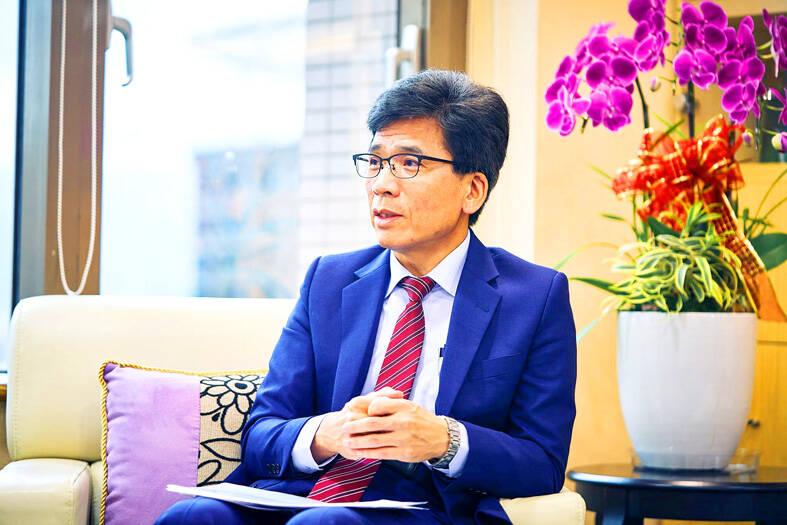Recent sales of stocks by overseas investors are a “short-term phenomenon” that do not represent a bearish view, with foreign holdings having been on an upward trend in the past few years, the Financial Supervisory Commission (FSC) said yesterday.
Foreign investors account for about 42 percent of Taiwan’s stock market, FSC Chairman Peng Jin-lung (彭金隆) said in an interview in Taipei.
That is up from 37.5 percent in 2022, he said.

Photo: An Rong Xu, Bloomberg
“Our total market cap is increasing, and foreigners maintaining their holdings at this level means their investments are increasing,” Peng said. “Are foreign investors retreating from Taiwan? We can’t tell — we only know that trading frequency is increasing.”
The TAIEX has dropped nearly 9 percent from its record close on July 11, with some investors concerned after former US president and Republican presidential candidate Donald Trump cast doubt over his commitment to defending Taiwan.
Still, the index is up about 24 percent this year, as investors pile into its suppliers of advanced computer chips used in everything from smartphones to artificial intelligence (AI).
The FSC is sketching out several scenarios that might emerge from the US election, but declined to elaborate or comment on the parties or candidates, Peng said.
“It’s not about who will win the US election, its about how their future policy could affect our industries,” he said.
Market sentiment that Trump would win back the White House surged earlier this month after an attempted assassination and his formal nomination, but US Vice President Kamala Harris, the likely Democrat nominee, has closed the gap with him in recent polls.
This year’s rally in Taiwan’s market, among the strongest in Asia, has been buoyed mostly by Taiwan Semiconductor Manufacturing Co (TSMC, 台積電), a major supplier of tech giants such as Apple Inc and Nvidia Corp, as well as other semiconductor shares riding on the global AI wave. TSMC alone accounts for 34 percent of the US$2.1 trillion stock market.
“It’s a common concern that our market trading is concentrated in a certain sector [such as chips], but that’s not a rare phenomenon in international markets,” Peng said.
“For example, Samsung is in the same situation in South Korea,” he said.
“There are different perspectives toward TSMC,” Peng said. “Some might be proud of it, some might worry it’s too big. What we hope is to have more companies like it.”

Semiconductor business between Taiwan and the US is a “win-win” model for both sides given the high level of complementarity, the government said yesterday responding to tariff threats from US President Donald Trump. Home to the world’s largest contract chipmaker, Taiwan Semiconductor Manufacturing Co (TSMC, 台積電), Taiwan is a key link in the global technology supply chain for companies such as Apple Inc and Nvidia Corp. Trump said on Monday he plans to impose tariffs on imported chips, pharmaceuticals and steel in an effort to get the producers to make them in the US. “Taiwan and the US semiconductor and other technology industries

SMALL AND EFFICIENT: The Chinese AI app’s initial success has spurred worries in the US that its tech giants’ massive AI spending needs re-evaluation, a market strategist said Chinese artificial intelligence (AI) start-up DeepSeek’s (深度求索) eponymous AI assistant rocketed to the top of Apple Inc’s iPhone download charts, stirring doubts in Silicon Valley about the strength of the US’ technological dominance. The app’s underlying AI model is widely seen as competitive with OpenAI and Meta Platforms Inc’s latest. Its claim that it cost much less to train and develop triggered share moves across Asia’s supply chain. Chinese tech firms linked to DeepSeek, such as Iflytek Co (科大訊飛), surged yesterday, while chipmaking tool makers like Advantest Corp slumped on the potential threat to demand for Nvidia Corp’s AI accelerators. US stock

SUBSIDIES: The nominee for commerce secretary indicated the Trump administration wants to put its stamp on the plan, but not unravel it entirely US President Donald Trump’s pick to lead the agency in charge of a US$52 billion semiconductor subsidy program declined to give it unqualified support, raising questions about the disbursement of funds to companies like Intel Corp and Taiwan Semiconductor Manufacturing Co (台積電). “I can’t say that I can honor something I haven’t read,” Howard Lutnick, Trump’s nominee for commerce secretary, said of the binding CHIPS and Science Act awards in a confirmation hearing on Wednesday. “To the extent monies have been disbursed, I would commit to rigorously enforcing documents that have been signed by those companies to make sure we get

UNUSUAL TIMING: The success of DeepSeek has prompted a scramble among its domestic competitors to upgrade their own AI models Chinese technology company Alibaba Group Holding Ltd (阿里巴巴) yesterday released a new version of its Qwen 2.5 artificial intelligence (AI) model that it said surpassed the highly acclaimed DeepSeek-V3. The unusual timing of the Qwen 2.5-Max’s release, on the first day of the Lunar New Year when most Chinese people are off work and with their families, points to the pressure Chinese AI start-up DeepSeek’s (深度求索) meteoric rise in the past three weeks has placed on not just overseas rivals, but also its domestic competition. “Qwen 2.5-Max outperforms ... almost across the board GPT-4o, DeepSeek-V3 and Llama-3.1-405B,” Alibaba’s cloud unit said in